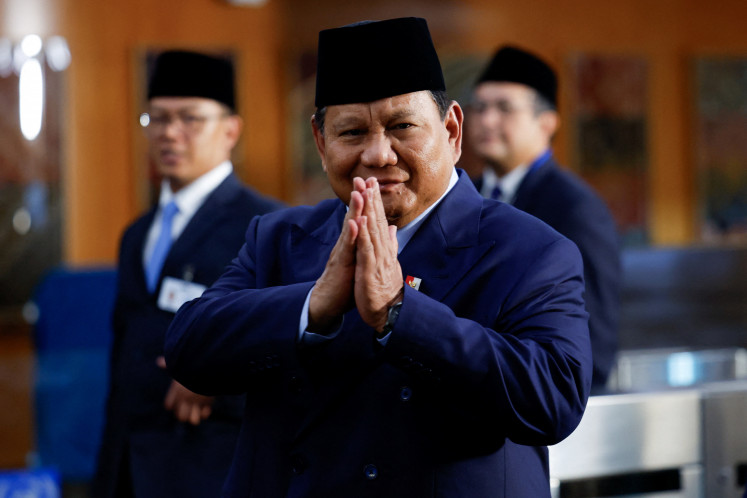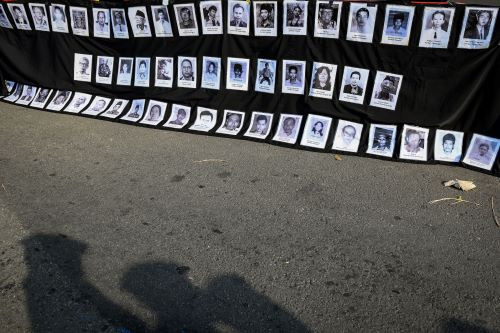Popular Reads
Top Results
Can't find what you're looking for?
View all search resultsPopular Reads
Top Results
Can't find what you're looking for?
View all search resultsInconvenient truths about teacher certification program
On March 14, 2013, the World Bank launched its publication âSpending More or Spending Better: Improving Education Financing in Indonesiaâ, which shows that the teacher certification program initiated in 2005 contributes little to the improvement of national education quality
Change text size
Gift Premium Articles
to Anyone
O
n March 14, 2013, the World Bank launched its publication 'Spending More or Spending Better: Improving Education Financing in Indonesia', which shows that the teacher certification program initiated in 2005 contributes little to the improvement of national education quality.
Ironically, the Education and Culture Ministry program absorbs about two thirds of the total annual state budget allocated for education. In 2010, for example, the program cost the state Rp 110 trillion (US$ 11.3 billion).
The World Bank conducted extensive data collection from 2009 onward to observe the impact of teacher certification on student learning at 240 public elementary schools and 120 junior high schools, including the testing of students and teachers in the Indonesian language and mathematics. The study compared students' test scores on math, science, Indonesian and English between those who were taught by certified teachers and those by uncertified ones.
The results demonstrated neither a significant difference between the two groups nor the influence of certified teachers on student achievement. For example, at junior high school level, statistically its causal effect was -0.07 with a margin error of 0.17 for 39,531students.
It comes as no surprise that after seven years of the teacher certification program, Indonesia's ranking in math, science and reading, as reported by International Mathematics and Science Study (TIMSS), and the Program for International Student Assessment (PISA), remains at the bottom of the list.
In 2011, TIMSS reported that Indonesia scored 386 in math, not much different from Syria's 380, Ghana's 366 and Oman's 329. In science, Indonesia scored 406, compared with Botswana's 404. Similarly, the PISA report (2009) revealed that Indonesia and Tunisia scored 371 in math each.
Those facts contradict UNESCO's (UIS-2009) finding that places Indonesia among the top few countries in the world with the lowest teacher-student ratio. At primary school level, the ratio is 1: 16.6, meaning that a teacher only teaches 16-17 students. This ratio is much lower than Japan (18.05), the United Kingdom (18.27) and even Singapore (17.44).
The World Bank publication reminds us of the documentary film An Inconvenient Truth (2006) directed by Davis Guggenheim about former United States vice president Al Gore's campaign to address global warming. Along with those inconvenient truths, the World Bank report divulges many mysteries and inconvenient realities which Indonesia has to address as soon as possible.
As mandated by the Teacher Law No. 14/2005, by 2015, all 3 million elementary and high school teachers have to be completely certified. This effort aims at improving teachers' professional competence, which would then trigger an improvement in national education quality as a whole.
The criteria for teachers to participate in the program include a minimum educational level of university graduate, minimum teaching workload of 24 hours per week, seniority, etc. The criteria have to match the four competencies mandated by the law such as academic, personality, pedagogic and emotional aspects. Since 2005, approximately 2 million teachers have been certified, with one-third certified on the basis of their prior learning assessment and work experience portfolio, while the remaining two-thirds participated in a 10-day or 90-hour training session in the education and training of professional teachers (PLPG)
program.
Those who have been certified were compensated with a doubled salary in addition to professional allowances. The Education and Culture Ministry announced that by 2015, only certified teachers would be allowed to teach, although it will cost an extra $7 billion as predicted by World Bank.
The core issue indeed is the obvious failure of teacher certification, which in my opinion stems from lack of management. The bureaucracy within the education sector keeps its old habits intact. Similar to the national exam, the pass rate of the teacher certification program has reached 100 percent every year. This is no more than a formality.
If this habit remains unbroken, there is no reason anymore to allow teachers to decide whether students pass their tests or not. They become mere optics, which diminishes the entire credibility of our national educational system.
In addition, professionalism appears to be another critical issue. In the PLPG implementation, it seems there is no single mechanism to observe how teachers demonstrate their competence in the classroom. As a result, the teacher certification process runs as a separate entity to the improvement of teaching and learning in the classroom.
When I worked for UNESCO in 1993-1994, I visited some schools in Manabo, Philippines. The teachers there only received additional incentives if they could significantly improve their teaching and learning activities in the classroom.
To qualify was quite simple, the school supervisors simply observed how teachers demonstrated their competence in their classroom with a check list of items such as unit lesson planning, innovative media availability, interaction with students, etc. This record would be the basis for teachers to get fair additional monthly remuneration and future career promotion.
It is seeking a utopia to improve the quality of our national education by neglecting the improvement of teaching and learning activities which take place in the classroom Hopefully, the World Bank's inconvenient truths will teach us a lesson for the sake of future generations and the future of our civilization.
The writer is a professor at Jakarta State University.










